-Who are the saints?
-Our vocation to sainthood and the beatitude-challenge.
-Why honour the saints and ask for their intercession?
-Can they really hear everyone praying at the same time in different languages?
-Does the Bible give us a clue of the intercession of saints?
(First Reading: Apocalypse 7:2-4,9-14 ; Responsorial Psalm: Ps. 23(24):1-6; Second Reading: 1 John 3:1-3; Matthew 5:1-12a)
The word “Saint” comes from the Latin “Sanctus,” which literally means “Holy.” In the New Testament, the term “Saint” is broadly used to refer to all who believe in Jesus Christ and who follow His teachings. Saint Paul often addresses his epistles to “the Saints” of a particular city (see, for instance, Ephesians 1:1 and 2 Corinthians 1:1). With time, it became clear that some Christians lived lives of extraordinary, or heroic, virtue, beyond that of the average Christian believer; these particular Christians were eminent examples of the moral virtues (or cardinal virtues), and they practised the theological virtues of faith, hope, and charity and exhibited the gifts of the Holy Spirit in their lives. Consequently, the word saint, previously applied to all Christian believers, became more narrowly applied to such people, with the belief that they are being rewarded in heaven, as such they were venerated after their deaths as saints, usually by the members of their local church or the Christians in the region where they had lived, because they were familiar with their good deeds; as stated above in the letter to the Hebrews (13:7). Since the word “Saint” means “Holy”, we can also use it to refer to the angels and other holy beings in heaven, for they are holy messengers of God set to always carry out His Will; that is why we often apply the term (saint) to them – Saint Michael, Saint Gabriel, Saint Raphael etc.
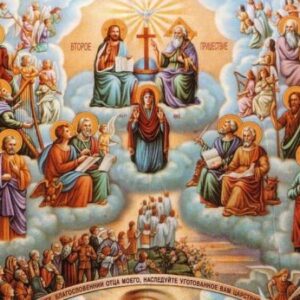
Celebrating today, the “Solemnity of All Saints,” Holy Mother Church venerates or honours all the Saints, known and unknown. That is, while most saints have a particular feast day in the Catholic calendar, not all of those feast days are observed. Also, we have some saints in Heaven (our brothers and sisters who led holy lives and have departed this world) who have not yet been canonized by the Church, and whose sainthood is known to God alone, they have no particular feast day. For this reason, the Church in her wisdom set aside a special day on November 1 to celebrate all holy men and women in heaven, as a way of remembering the outcome of their lives and imitating their faith; just as the Letter to the Hebrews commands us to do: “Remember your leaders, who spoke the word of God to you. Consider the outcome of their way of life and imitate their faith.” (Hebrews 13:7).
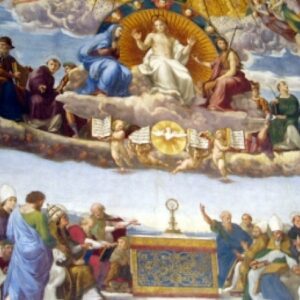
The vision of St. John as reflected in today’s first reading reveals the reality of what we are celebrating – all the saints in their heavenly glory. Part of the passage reads: “…a great multitude that no one could count, from every nation, from all tribes and peoples and languages, standing before the throne and before the Lamb, robed in white, with palm branches in their hands.” According to Pope Benedict XVI, “These people include the Saints of the Old Testament, starting with the righteous Abel down to the faithful Patriarch, Abraham, extending to those of the New Testament, the numerous early Christian Martyrs, and the Blesseds and Saints of later centuries, to the witnesses of Christ in this epoch of ours.” This consoles us in the sense that the Solemnity of “ALL SAINTS” includes those members of our families, communities, tribes, nations, etc., who died a holy death, and are in heaven, but are not mentioned yet in the Church’s Canon of saints. Therefore, on the Solemnity of All Saints, they are remembered and honoured here on earth. The first reading also brings us consolation to know that heaven won’t be “scanty” at the last day but would be inherited by a vast number of people, and uncountable multitude, from every tribe, tongue and peoples, languages and nation, including YOU AND I, who do the will of God. This is why in the second reading, the Apostle John suggests that saints are people who have responded generously to the love God has showered on them. St. John tells us that to be “saints” means to be “children of God”—and then he adds: “so we are!” Therefore, “All Saints Day” reminds us that we are called to be part of that vast multitude of holy ones whose numbers are so great they cannot be counted.
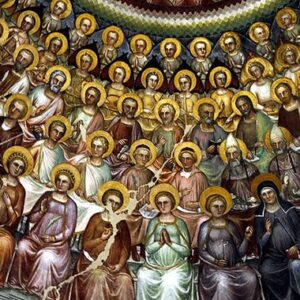
Nevertheless, the invite to be part of the vast multitude of uncountable saints goes with a huge responsibility and sacrifice, as John noted at the end of today’s first reading: ‘These are the people who have been through the great persecution, and they have washed their robes white again in the blood of the Lamb.’ To “pass through the great persecution and wash one’s robe white in the blood of the Lamb requires living out the beatitudes as Christ urges us in the gospel reading. Put differently, the saints (the vast multitudes of people around the throne) who we celebrate, are those who walked the hard and narrow path of the Beatitudes to arrive at their Heavenly bliss. As Pope benedict remarks, “the blessed par excellence is only Jesus. He is, in fact, the true poor in spirit, the one afflicted, the meek one, the one hungering and thirsting for justice, the merciful, the pure of heart, the peacemaker. He is the one persecuted for the sake of justice.” The Beatitudes are God’s commandments expressed in positive terms. They go far beyond what is required by the Ten Commandments, and they are a true and reliable recipe for sainthood.

Analysing the beatitudes, we see that Poverty of spirit is knowing and embracing our need for God. Mourning is experiencing the sufferings of life and finding comfort in God. Meekness is docility to God’s will and embracing the path of humility, gentleness, and patience with others, even in the face of hardships and challenges. Hunger for justice is the yearning for God in order that everyone enjoys peace, happiness, justice, etc., by the merits of Christ. We obtain mercy by extending it to others. Purity of heart is that sincerity that puts God first and becoming Godlike in our thoughts, words and actions. Suffering for doing what is right is a way of following the way of the cross (the paths of Christ) accompanied by deep happiness. These beatitudes are the virtues of those who seek God’s face, as we sing the Responsorial Psalm of the Liturgy: “For such are the people who seek the face of God.” The people who seek God’s face are those who climb the “heavenly mountain of God” and stand in his holy place, those with clean hands and pure hearts, who desire not worthless things…as the Psalmist clearly expresses. Above all, the Psalmist says that they shall receive blessings from the Lord and REWARD from the God who saves them – this reward is ETERNAL LIFE – SAINTHOOD!

Thus, the saints are those who most perfectly manifested the Christ-like character described in the first part of the beatitudes, and who therefore now partake of the promises in the second part: “Theirs is the kingdom of heaven.” We should see the beatitudes not as a prescription of what we must do per se to become blessed, but as a description of what a human being is like whom Jesus Christ is transforming into a saint! Jesus is telling us that when the transformative power of the cross brings about in us a greater meekness, poverty of spirit, and so forth, we will experience that we are being blessed.

Therefore, we need to accept the noble call of Christ to live out the Beatitudes in today’s gospel in order to be counted among the vast multitudes around the throne of God at the last day.
We also need to ask for the intercession of the saints in heaven, for they are the “righteous ones” in heaven, and their prayers are very efficacious before God, as James wrote in his epistle (James 5:16): “The prayer of a righteous man is powerful and effective.” In Revelation 6:10, we learn that the saints in heaven know what is going on down here on earth (see also, Hebrew 12:1 – “we are surrounded by a cloud of witnesses”). Revelation 5:8 and 8:3 plainly state that the saints and angels present our prayers to God in the form of incense. Thus, the saints pray with us to Jesus as our intercessors. They do not stand “between” us and God. Needless to say, they only pray with us and for us to Jesus who is the MEDIATOR and the WAY. This can be seen, for example, in Revelation 5:8, where John depicts the saints in heaven offering our prayers to God under the form of “golden bowls full of incense, which are the prayers of the saints.” But if the saints in heaven are offering our prayers to God, then they must be aware of our prayers. They are aware of our petitions and present them to God by interceding for us.

Another Scriptural passage where we see the intercessory role of the saints is in Exodus 23:20-23. Here, God said: “Behold I am sending my angel before you, to guard you on the way and bring you to the place I have prepared. Be attentive to him and obey him. Don’t rebel against him, for he will not forgive your sins. My authority is within him.” In the Gospel of Matthew, we hear Jesus saying: “See that you don’t despise one of these little ones, for I say to you that their angels in heaven look upon the face of my heavenly Father” – Matt 18:10. The phrase “look upon the face” (apart from enjoying the beatific vision) can also be referred to an act of seeking for a favour. This is similar to the expression in Psalm 123:2 – “Just as the eyes of slaves are on their masters’ hand, or the eyes of a slave-girl on the hand of her mistress, so our eyes are on the Lord our God, till He shows us His mercy.” Similarly, the eyes of the angels are always on the Lord God, till He shows his favour to us His Children. This is a great act of interceding to God on our behalf. Hence, in this regard, Jesus tells us indirectly of the intercessory role of angels in heaven.
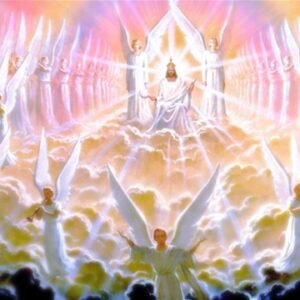
A popular objection to the intercessory roles of saints is: “How, then, can Mary and the saints listen to and answer thousands upon thousands of petitions made simultaneously in many different lands and in many different languages? Many of such petitions are expressed, not orally, but only mentally, silently. How can Mary and the saints, without being like God (omnipresent and omniscient) know the secrets of all hearts? Does it mean that they are also omnipresent and omniscient like God?” A simple response to this is; if being in heaven were like being in the next room, then, of course, these objections would be valid. This really shows that those who make these objections possess a poor view of heaven; they have failed to understand that those in heaven are not restricted by space and time. Space and time are only qualities of this material universe. A mortal, unglorified person in the next room would indeed suffer the restrictions imposed by the way space and time work in our universe. However, the Saints are not in the next room, and they are not subject to the time/space limitations of this life; for time and space only makes meaning in this life and not in the life hereafter. This does not imply that the saints in heaven, therefore, must be omniscient, as God is; it is only by God’s grace that they can communicate with others in heaven or with us. And the argument about petitions arriving in different languages is even further off the mark. Also, does anyone really think that in heaven the saints are restricted to languages? After all, it is God himself who gives the gift of tongues and the interpretation of tongues. To be in heaven is to enjoy the fullness of God’s graces and benefits. Therefore, it is by God’s grace and benefits that the Blessed Virgin Mary and all the Saints are able to understand the numerous languages on earth and at the same time. Surely those saints in Revelation understand the prayers they are shown to be offering to God.
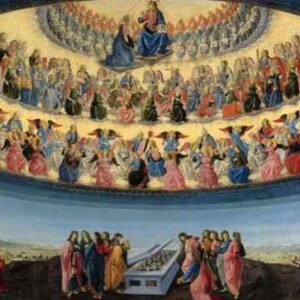
Following this truth of Sacred Scripture and Tradition, the Church in all her wisdom and guided by the Holy Spirit, set aside a day like this (1st November) as the Solemnity of All Saints. It is a Holy Day of Obligation; hence, we are obliged to attend Mass; and unite our prayers with those of the Saints; asking God to grant us the graces of the Beatitudes, so that on the last day, we may be counted among the faithful in the company of the saints.
Shalom!
© Fr. Chinaka Justin Mbaeri, OSJ
Paroquia Nossa Senhora de Fatima, Vila Sabrina, São Paulo, Brazil
nozickcjoe@gmail.com / fadacjay@gmail.com
___________________________________
PS: Have you prayed your Rosary today?
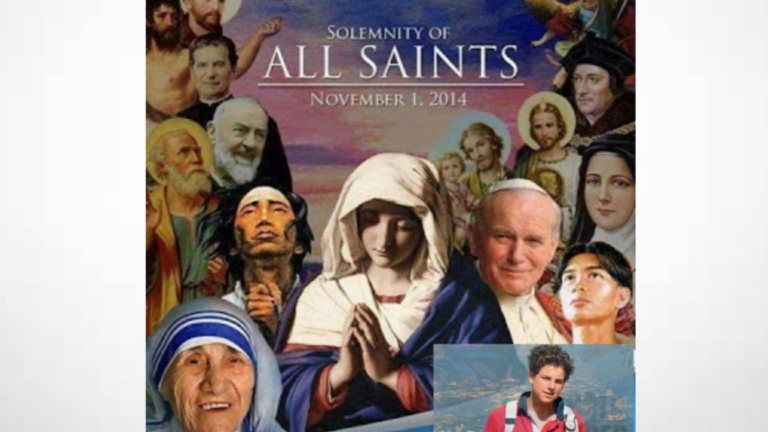



Thanks. I keep learning new things from your reflections.
You are welcome!
Praise be to God. May the saints in heaven pray for us.
Amen